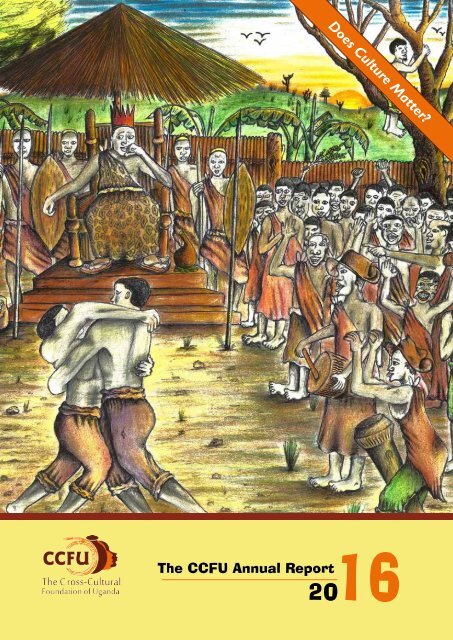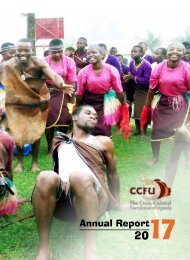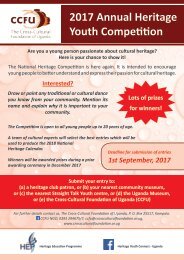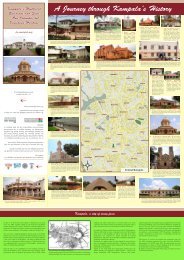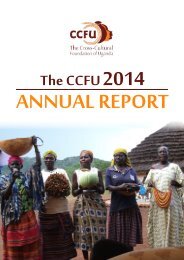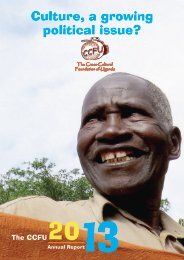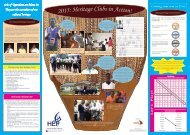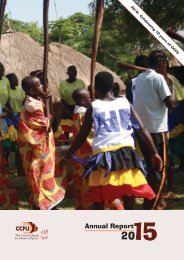CCFU Annual report 2016 Final
Does Culture Matter: Cultural affairs captured more media attention in 2016 than ever before. Does this reflect a growing acknowledgment by Ugandans that “culture matters”? A media review indicates a variety of developments in the culture sector in 2016.
Does Culture Matter: Cultural affairs captured more media attention in 2016 than ever before. Does this reflect a growing acknowledgment by Ugandans that “culture matters”? A media review indicates a variety of developments in the culture sector in 2016.
Create successful ePaper yourself
Turn your PDF publications into a flip-book with our unique Google optimized e-Paper software.
Does Culture Matter?<br />
The <strong>CCFU</strong> <strong>Annual</strong> Report<br />
1
Illustration by Joshua Muyinza, 1st prize winner at the <strong>2016</strong> National Heritage Competition for Youth<br />
Welcome<br />
A word from our Chairperson 1<br />
Does Culture Matter? - The culture year in review 3<br />
Programme highlights 7<br />
The Six <strong>2016</strong> National Heritage Awards Winners 11<br />
Support us 12<br />
<strong>CCFU</strong> News 14<br />
In the coming year... 15<br />
Thank you 16
A Word from the Board<br />
Public discussions about the role of culture in development tend to generate (or degenerate into)<br />
contradictory arguments among Ugandans. On the one hand they tend to blame the ills of modernity<br />
on the erosion of traditional cultural values and norms. On the other hand, African culture(s) are<br />
castigated as generators and conveyors of structural and spiritual impediments to change, innovation<br />
and development in various fields.<br />
As the <strong>CCFU</strong> embarks on its second decade<br />
of organizational life it can proudly look back<br />
with intellectual humility on a steady record of<br />
injecting and sustaining the cultural paradigm<br />
as both a grassroots (community) and policy<br />
learning process of dialogue and action.<br />
As this publication bears out, <strong>CCFU</strong> far from<br />
being hamstrung by real or perceived ‘paradoxes’<br />
of the cultural approach, has instead engaged and<br />
urged development planners and practitioners to<br />
take a balanced view of these coexistent realities<br />
which run deep below the lived experiences and<br />
practices of the concerned communities.<br />
This brings to the fore the question of cultural<br />
ways of knowing as a basis for cross-cultural<br />
understanding and cross-valuation. But it also<br />
underlines the need for cultural activists to seek<br />
a more nuanced understanding of how and why<br />
culture is deployed by the various social-cultural<br />
forces within a community to propel particular<br />
values and norms: could it be for purposes of<br />
domination, survival, resistance, etc? In this<br />
regard, the issue of cultural rights should be<br />
grounded further in the context of the perennial<br />
land question. From <strong>CCFU</strong>’s perspective, this calls<br />
for more understanding and accommodation of<br />
communities who attach deep value to land as<br />
a cultural property and as a cultural-spiritual<br />
relation between land, forests, animals and people.<br />
The development vocabulary in Uganda is replete<br />
with abundant references to cross-cutting issues.<br />
That such issues have cultural dimensions or,<br />
indeed, that culture is a cross-cutter in its own<br />
right, seems not yet to carry sufficient sway<br />
in decision making circles of government to<br />
heed calls and pleas for a Ministry of Culture.<br />
Development that takes a fragmented instead of<br />
a focal approach to the cultural imperatives of<br />
its programmes risks impoverishing them all and<br />
ultimately courts failure. Thus, <strong>CCFU</strong> and all its<br />
partners will and should sustain the momentum<br />
behind the call for a Culture Ministry as a defining<br />
issue for the new decade.<br />
Luutu Mukasa<br />
Chairperson<br />
Associate Professor,<br />
University of South Africa,<br />
Marcus Garvey Institute<br />
1
2<br />
The culture year<br />
in review
Does culture matter?<br />
Cultural affairs captured more media attention last year than ever before. Does this reflect a<br />
growing acknowledgment by Ugandans that “culture matters”? This media review indicates a<br />
variety of developments in the culture sector in <strong>2016</strong>.<br />
Cultural leaders in prominence.<br />
For a start, Ugandans continued in <strong>2016</strong> to<br />
demonstrate their pride in their cultural identity<br />
and their allegiance to their cultural leaders.<br />
Throughout the year, these leaders expressed<br />
their concern to uphold cultural values for<br />
current and future generations. The kings of<br />
Buganda and Tooro along with Rwot Onen Acana<br />
II of Acholi for instance called upon communities<br />
to take pride in showcasing their diverse cultures<br />
and promoting cultural norms. The Bunyoro<br />
Kingdom advocated for the national recognition<br />
of Omukama Kabalega for his fierce resistance to<br />
British dominance and demanded the return of<br />
cultural items held in foreign museums.<br />
Cultural leaders in Bunyoro, Busoga and Buganda<br />
also encouraged the youth to embrace agriculture,<br />
recalling the value of indigenous varieties and<br />
the need to restore traditional granaries for<br />
food security in the face of changing climatic<br />
conditions. They also flagged their concerns<br />
about health through immunisation and other<br />
health campaigns. In Buganda and Tororo, they<br />
warned against harmful cultural practices such<br />
as ritual sacrifice. Their message was also one of<br />
peace. The King of Toro and the Obundigya Bwa<br />
Bamba castigated people who incite violence and<br />
tribal hatred.<br />
Land is an important cultural resource that<br />
informs people’s sense of identity, belonging<br />
and status. It can also be the source of conflicts,<br />
including between cultural institutions. This year,<br />
disputes arose between Buganda and Bunyala;<br />
Ma’di and Acholi; Bunyoro, Buganda and the<br />
National Forestry Authority. In Bunyoro, cultural<br />
leaders demanded laws on land acquisition<br />
prompted by the destruction of heritage sites<br />
and limited compensation to land owners<br />
and occupiers, following oil industry activities.<br />
Several cultural leaders opposed amendments to<br />
the Land Act proposing compulsory acquisition<br />
of land for national development projects,<br />
which they perceive as compromising ancestral<br />
property. Cultural leaders in the Ma’di sub-region<br />
rose up to protect Zoka forest against plunder<br />
(pictured above).<br />
It is therefore no surprise that, in the <strong>2016</strong><br />
presidential elections, chiefs and kings were<br />
perceived as influential power centres and were<br />
regularly drawn into party affairs (contrary to the<br />
law). Their allegiance to the State – which provides<br />
a stipend to many of them – also emerged as a<br />
contentious issue. In several instances, even the<br />
leadership of cultural institutions was contested.<br />
As the year came to a close, conflicts again<br />
erupted in the Rwenzori region, eventually<br />
leading to the incarceration of prominent leaders<br />
3
of the Rwenzururu Kingdom, including Omusinga<br />
Charles Mumbere. Some members of the public<br />
called for a review of the Traditional and Cultural<br />
Leaders’ Act to mitigate conflicts caused by gaps<br />
in the current law, especially where potentially<br />
competing cultural institutions are active in the<br />
same geo-cultural space.<br />
Cultural markers, symbols of our<br />
history and identity.<br />
Tangible and intangible culture can be identified,<br />
represented and safeguarded in many different<br />
ways. Buildings and sites represent human<br />
intellect and creativity, the history of a people,<br />
the identity of a place, the social order of a<br />
community and its respect for nature. This year,<br />
the Mayor of Jinja and the Busoga kingdom halted<br />
the demolition of the Ripon Falls Hotel for its<br />
historical significance – as one of the country’s<br />
first hotels and the place where Queen Elizabeth<br />
II shared a meal with Kyabazinga Nadiope on her<br />
1954 visit to Uganda. In Masaka, Our Lady of the<br />
Rosary Narozali Catholic Church, still standing<br />
after 115 years, marks the first years of the White<br />
Fathers in the country, and efforts to maintain<br />
the 2000-seater structure are taking into account<br />
its original architectural workmanship. Similar<br />
efforts with the Bugomba-Mapera Catholic<br />
Church in Kalangala are underway.<br />
Such initiatives are not always emulated. In the<br />
Tooro Kingdom, a controversial proposal to<br />
turn the Council Chambers into a hotel was<br />
eventually agreed upon. Plans by Government to<br />
construct two 20-storied buildings in the parking<br />
lot of the Uganda National Cultural Centre<br />
(pictured above) sparked spirited reactions from<br />
artists and the general public, who demanded<br />
that the integrity of Uganda’s only National<br />
Theatre be protected. Across the country, the<br />
remarkable efforts of individuals and institutions<br />
to preserve these symbols of our history and<br />
culture demonstrate that culture matters!<br />
Mother tongue, the foundation for<br />
understanding and learning.<br />
The merits and demerits of the thematic<br />
curriculum have gripped educationalists since it<br />
was introduced ten years ago. Claims that learning<br />
in one’s mother tongue enhances retention of<br />
knowledge, confidence, improves learner-parent<br />
relations, and enhances guardians’ appreciation<br />
of education have encouraged advocates of<br />
the thematic curriculum and have even led to<br />
suggestions to include it in the nursery school<br />
curriculum. The Kabaka of Buganda has urged<br />
teachers and school proprietors to teach Luganda<br />
to cement the kingdom’s culture and norms.<br />
Ekisaakate, a cultural heritage education initiative<br />
established by the Queen of Buganda marked 10<br />
years, while in Buruuli, the cultural institution<br />
supported the development of Ruruuli language<br />
school books. During the election period,<br />
councillors across the country struggled to swear<br />
their oaths in English and Mukono Town Council<br />
resolved to conduct meetings in Luganda. Some<br />
argued that the death of our languages will result<br />
in the demise of oral traditions and expressions<br />
- the mainstay of many of our cultures.<br />
Some parents across the country have however<br />
expressed the fear that their children will be<br />
disadvantaged because they are not able to speak<br />
and write in English at an early age. This, coupled<br />
with limited resources, and inadequate teacher<br />
competence and willingness, has resulted in only<br />
half the schools in the country taking up the<br />
thematic curriculum, according to the Ministry<br />
of Education.<br />
Showcasing our oral traditions.<br />
Oral traditions define Uganda’s diverse cultures<br />
but this valuable knowledge needs to be captured<br />
and passed on to the next generations in a medium<br />
that will stand the test of time. In <strong>2016</strong>, we were<br />
reminded of this wealth. Kabann Kabananukye<br />
captured the knowledge of elders in his book<br />
on “Clans and Totems of the Banyakigezi.” Sr<br />
Dominic Dipio captured a Ma’di custom in a film<br />
“Rainmaking: a Disappearing Practice”. This is still<br />
4
alive amongst the Iteso in Amuria district, who<br />
performed it – and received a downpour!<br />
Uganda’s submission for the urgent safeguarding<br />
of its sixth element, the Ma’di Bowl Lyre music<br />
and dance (O’di) was approved under the 2003<br />
UNESCO Convention for the Safeguarding of<br />
the Intangible Cultural Heritage. The Bayimba<br />
Cultural Foundation held the ninth edition of<br />
its International Festival of Arts which brought<br />
together renowned artistes and showed African<br />
absenteeism and early marriages that sometimes<br />
result from this practice.<br />
Elsewhere, <strong>report</strong>s on female genital mutilation<br />
by communities from Kween and Bukwo<br />
illustrated the resilience of cultural beliefs and<br />
customs. Despite being illegal in Uganda and<br />
despite spirited denouncement by civil society<br />
actors, the practice continues, often across the<br />
border. As the Sabiny demonstrate that their<br />
culture matters, there is a need to understand<br />
their cultural logic and to employ appreciative<br />
inquiry, which may yield better results than the<br />
forceful application of the law.<br />
The right to access, express and enjoy one’s<br />
culture is often taken for granted until one is<br />
deprived of it, as illustrated by Ankole loyalists<br />
who continued to demand the restoration of<br />
their kingdom, abolished in 1967.The Benet who<br />
were evicted from the forests of Mt Elgon; and<br />
Batwa communities who were expelled from<br />
Bwindi and Semuliki forests (pictured), demanded<br />
films. The National Museum co-organised a<br />
colourful national cultural exhibition which<br />
attracted a diversity of actors from across the<br />
country, and Uganda displayed this diversity<br />
at international exhibitions in Italy and in the<br />
United States.<br />
Exercising cultural rights.<br />
<strong>2016</strong> was the year of the Imbalu, the customary<br />
circumcision rites performed by the Bamasaba.<br />
The traditional drums were heard in all corners<br />
of the country and demonstrated the importance<br />
of this cultural right. Rights must however be<br />
accompanied by responsibility and the public<br />
raised concern about the promiscuity, school<br />
land and access to their cultural resources. They<br />
are also deprived of adequate education and<br />
other services - marginalised because of their<br />
cultural identity and small numbers.<br />
Various actors attempted to bring this<br />
situation to the attention of policy makers and<br />
implementers. It is anticipated that the first<br />
Member of Parliament from the ethnic minority<br />
Ik community will add his voice to alert the public<br />
about the concerns of indigenous minorities.<br />
Traditional ancestral beliefs are rarely a proudly<br />
exhibited public affair. Yet, people of all walks of life<br />
will exercise their cultural right and visit shrines<br />
for worship and thanksgiving. Today, shrines are<br />
however dubbed hubs of witchcraft, and riddled<br />
5
with stories of con artists and human rights<br />
abuses, resulting in endless controversy. A recent<br />
<strong>report</strong> notes that Ugandans have a tendency to<br />
switch religions more than any other people in<br />
Africa – could this possibly mean that, in spite<br />
of ‘modernity’ and religious conversion, culture<br />
indeed still matters?<br />
In conclusion…<br />
<strong>2016</strong> amply demonstrates that yes,<br />
culture matters. It matters because<br />
it provides a sense of belonging and<br />
collective memory which many will<br />
fight to protect. It informs our ability<br />
to learn and to express meaning –<br />
ultimately manifested in our actions. It<br />
matters because it motivates people<br />
to mobilise around issues that they<br />
believe are important for their lives<br />
and that of future generations. And it matters<br />
because it triggers a sense of responsibility for<br />
the less privileged in society. Culture is thus<br />
about power and sharing resources, and hence<br />
assumes an important political and development<br />
dimension.<br />
Yet, if culture mattered so much in <strong>2016</strong>, why is<br />
Uganda the only East African country without a<br />
Ministry of Culture? Why is the national budget<br />
allocation to culture well below 1%? Why is<br />
valuable tangible and intangible cultural heritage<br />
safeguarded<br />
from without<br />
rather than<br />
from within?<br />
Why do<br />
Ugandans<br />
have to study<br />
anthropology,<br />
heritage or<br />
m u s e u m<br />
studies in universities outside the country? These<br />
are questions <strong>CCFU</strong> will address itself in the<br />
course of the coming year.<br />
6
Programme<br />
Highlights<br />
7
1. Where is culture? – the ‘Culture in Development’<br />
approach<br />
It is increasingly recognised that development<br />
outcomes will only be truly sustainable on the<br />
African continent if they are in tune with the<br />
cultural identity and ambitions of its peoples.<br />
<strong>CCFU</strong> has worked since its inception to promote a<br />
positive understanding of culture in development,<br />
recognising culture as a vital ingredient of<br />
effective and equitable change. Yet, what does<br />
culture look like? Where does one look for this<br />
valuable resource? How can it be integrated in<br />
one’s development practice? At <strong>CCFU</strong>, suggesting<br />
answers to these questions have continued to<br />
inform our research and training work in <strong>2016</strong>.<br />
The new “Culture in Development”<br />
guide<br />
<strong>CCFU</strong> completed a new and expanded edition of<br />
its “Introducing Culture in Development” guide,<br />
based on experiences in Uganda, Kenya and<br />
Zimbabwe, and prepared for trainers and handson<br />
development practitioners.<br />
The guide includes a series of methods and<br />
tools, among others, to map cultural heritage,<br />
understand culture in the organisation, work with<br />
women as transmitters of cultural knowledge,<br />
make use of cultural practices for positive change,<br />
and to deal with cultural controversies.<br />
To publicise this guide and to promote the<br />
approach, <strong>CCFU</strong> organised an event in early<br />
<strong>2016</strong> to hear development practitioners who<br />
have used it to share their experiences. The event<br />
brought together participants from development<br />
organisations, government institutions, cultural<br />
institutions, the media and academia.<br />
Interested in joining<br />
our next “Culture in<br />
Development” course?<br />
This will take place in April 2017<br />
in the vicinity of Kampala. At the<br />
end of the training, you will be<br />
able to:<br />
• Deepen your appreciation of<br />
culture<br />
• Identify points for cultural<br />
interventions<br />
• Use a range of practical filed<br />
tools to analyse culture<br />
• Have an opportunity to<br />
appreciate and respond to the<br />
cultural context<br />
• Integrate culture in your<br />
development programmes.<br />
Contact us!<br />
8
2. Cultural rights are also human rights!<br />
Few Ugandans are conversant with cultural<br />
rights, although these are as important as any<br />
others and they are provided for under national<br />
and international law. Cultural rights concern<br />
language, cultural and artistic production,<br />
participation in cultural life, cultural heritage,<br />
intellectual property rights, and minorities’<br />
expression of their culture.<br />
Given this limited awareness, <strong>CCFU</strong> developed<br />
a booklet on “Understanding Cultural Rights”<br />
(to be published in 2017) and ran a training<br />
event to introduce cultural rights to human<br />
rights organisations and relevant government<br />
agencies, and to discuss how these organisations<br />
can incorporate cultural rights in their agenda.<br />
<strong>CCFU</strong> also contributed to the section on<br />
cultural rights in the national periodic <strong>report</strong> that<br />
was submitted to the UN Council on Human<br />
Rights. Among the recommendations made<br />
to government was the need to mainstream<br />
cultural rights in all programmes implemented<br />
by government institutions, highlighting culture<br />
as a foundation for social cohesion, employment<br />
and nation building. This <strong>report</strong> was used to peer<br />
review the status of rights compliance in Uganda,<br />
in Geneva in November <strong>2016</strong>.<br />
<strong>CCFU</strong> continued working with different<br />
stakeholders to promote the cultural rights<br />
of Uganda’s indigenous minority groups. A<br />
national coalition of like-minded organisations<br />
was formed. Efforts to document<br />
the life and history of a small<br />
Batwa community in Semuliki<br />
started. The Ik, Thur and Babwisi,<br />
Bavonoma and Bamba continued<br />
their partnership with <strong>CCFU</strong> to<br />
protect their heritage. An advocacy<br />
platform was also established with<br />
5 minority groups in Northern<br />
Karamoja: the Ngikutio, Ik, Napore,<br />
Mening and Nyangia.<br />
for possible sources of redress. In <strong>2016</strong>, <strong>CCFU</strong><br />
started research to explore the possibility of<br />
using the “culturally defined rights” of women<br />
in Acholi to promote their empowerment.<br />
<strong>CCFU</strong> also embarked on supporting youth and<br />
women groups (Go Culture Africa, Rwebisengo<br />
Widows’ Cultural Association) to better utilise<br />
their cultural heritage as business opportunities.<br />
This is expected to continue through 2017 and<br />
to grow with time.<br />
Cultural leaders influence community governance<br />
and act as gatekeepers of our heritage. <strong>CCFU</strong> has<br />
continued to work with them and in <strong>2016</strong> support<br />
was extended to the 3 cultural institutions in<br />
Bunyoro, Acholi and Alur to develop guidelines<br />
to inform the engagement of oil extracting<br />
companies with them. These guidelines will be<br />
completed and published in 2017.<br />
Support was also extended to the people of<br />
Ma’di, Rakai and Kibaale to preserve and promote<br />
their heritage. In Rakai, an Ordinance to protect<br />
the Namagoma urban forest was developed<br />
and is awaiting District assent. Heritage sites<br />
in Rakai were publicised on television to<br />
encourage cultural tourism. The Kibaale Heritage<br />
Development Project received support to<br />
document sites of cultural importance in the<br />
district. The Ma’di community museum was also<br />
supported and awaits your visit!<br />
Culture has often been blamed<br />
for the violation of women’s and<br />
young people’s human rights. Little<br />
effort is made to examine culture<br />
9
3. Promoting cultural heritage<br />
With the threats facing our heritage, it is<br />
imperative to change public perceptions on its<br />
usefulness and to help young people become<br />
proud of their cultural heritage and aware of<br />
their role in its preservation.<br />
Cultural heritage education clubs are now in<br />
existence in over 100 secondary schools. Six<br />
years of the heritage education programme<br />
have created a ripple effect with more schools<br />
requesting to join. The support from community<br />
museums and patrons has continued to<br />
contribute to vibrant clubs. As has become the<br />
custom, the annual heritage awarding ceremony<br />
for youth was held, unveiling the heritage<br />
calendar with illustrations on traditional games<br />
and sports by the competition winners (out of<br />
the 260 entries received). The cover page of this<br />
annual <strong>report</strong> depicts one these winning entries.<br />
Reflecting the importance of our built heritage<br />
as landmarks of Uganda’s history, the Foundation<br />
has continued its activities to protect and<br />
promote the heritage of Kampala. Following last<br />
year’s production of a map of Kampala’s historic<br />
buildings and sites, <strong>CCFU</strong> trained owners and<br />
managers of selected buildings and tour guides to<br />
manage and promote their properties as tourism<br />
centres and started developing information<br />
materials on three such sites, the Ham Mukasa<br />
residence in Rubaga, the St. Catherine ward<br />
at Mengo Hospital and Makerere University.<br />
Ultimately, the protection of our built heritage<br />
will depend on an effective legal framework<br />
and <strong>CCFU</strong> initiated discussion in <strong>2016</strong> with the<br />
Kampala Capital City Authority to enact a byelaw<br />
to that effect.<br />
<strong>CCFU</strong> continued to network internationally in<br />
<strong>2016</strong>: we took part, in our capacity as vice-chair<br />
of the International National Trusts Organisation,<br />
in meetings of the organisation. The Foundation<br />
also continued to work with UNESCO in the<br />
framework of the 2003 Convention for the<br />
Safeguarding of the Intangible Cultural Heritage:<br />
we attended the 11th Inter-Governmental<br />
Meeting held in Ethiopia as an accredited NGO<br />
and made presentations to delegates on our<br />
work at the ICH NGO Forum.<br />
Villa Necchi Campiglio: INTO Executive Committee members visit FAI property, Milan, Italy<br />
10
The Six <strong>2016</strong> National Heritage Awards Winners<br />
A few exemplary individuals, families and<br />
organisations have taken the initiative to preserve<br />
elements of our built and of our intangible<br />
heritage. The significance of their efforts is rarely<br />
recognised and <strong>CCFU</strong> was therefore especially<br />
pleased to organise the Second National<br />
Heritage Award ceremony in <strong>2016</strong>. With the<br />
help of a jury, three awardees were recognised<br />
for their contribution to the development of our<br />
intangible cultural heritage and three for their<br />
work to protect our built or natural heritage<br />
Intangible Heritage:<br />
Dr. Albert Ssempeke (RIP) and family for its<br />
contribution to preserving the musical<br />
heritage of Buganda<br />
Tangible Heritage:<br />
Richard Atya Cwinyaai for leading the Nebbi<br />
Cultural Troupe into an effective advocate of<br />
positive cultural values<br />
The Ndote family for turning the manufacture<br />
of traditional musical instruments into a viable<br />
business enterprise<br />
St Peter’s School in Nsambya for carefully conserving their ‘Fort Jesus’ building (1895-1907)<br />
The Madhvani family and group of companies for restoring and effectively<br />
making use of their first building (1922) in Jinja<br />
Dr. Yahaya Sekagya and PROMETRA for preserving Buyijja forest and<br />
using it to promote our traditional knowledge of medicinal plants<br />
11
Support our campaigns to promote heritage!<br />
All youth must have access to their<br />
culture<br />
With the breakdown of family values, and with<br />
limited formal spaces to learn about heritage,<br />
the youth - who are the future custodians of our<br />
heritage - are rarely supported to appreciate the<br />
positive aspects of culture.<br />
To address this important but neglected aspect<br />
of our social development, heritage education<br />
should be fully integrated in the upcoming<br />
national curriculum for secondary schools in<br />
Uganda. Government should retain the use of<br />
local languages as a medium of instruction in<br />
lower primary schools. It should invest in building<br />
the capacity of school teachers to educate the<br />
youth about cultural heritage and it should ensure<br />
that the National Council for Higher Education<br />
supports tertiary institutions to develop courses<br />
on heritage studies, intangible cultural heritage<br />
and related disciplines<br />
All Ugandans are entitled to their<br />
cultural rights<br />
Cultural rights concern many of the aspects of<br />
life that we treasure and that merit protection.<br />
States must refrain from interfering with the<br />
enjoyment of these rights by everyone, without<br />
discrimination; while taking measures that lead to<br />
their fulfilment by all.<br />
Help us make Heritage Education a<br />
reality for all youth in Uganda!<br />
The rights of indigenous people need better<br />
protection. Ethnic minorities include the more<br />
than 1 million fellow Ugandans, who are often<br />
stereotyped by their neighbours and known by<br />
derogative names. Their political representation<br />
is still limited and, in several cases, their language<br />
is disappearing and their access to cultural sites<br />
(such as within national parks) is restricted.<br />
Further, they are often at risk of seeing<br />
their culture assimilated by more numerous<br />
neighbouring groups. We call on Government<br />
to ensure that the cultural rights of indigenous<br />
minorities are respected.<br />
Support the national coalition for<br />
Indigenous Minorities’ Rights!<br />
12
Our built heritage must be saved<br />
The historical and cultural fabric of a country<br />
is essential to its well-being and identity. A city’s<br />
history is appreciated, by the quality of life<br />
and cannot be provided by uniform glass and<br />
concrete towers that attract traffic jams and<br />
pollution. Cultural distinctiveness also generates<br />
income through tourism. Municipal authorities,<br />
including Kampala, therefore have a duty to<br />
preserve the historical value of their cities for<br />
the benefit of present and future generations. Yet<br />
Uganda needs a Ministry of Culture<br />
The Government established a Ministry of<br />
Culture and Community Development soon<br />
after independence, and this spearheaded many<br />
actions that strengthened the cultural sector, such<br />
as with the world-famous Heartbeat of Africa<br />
troupe (see photo). In the 1990s however, the<br />
culture function was split within two ministries<br />
and relegated to the status of departments (now<br />
“Culture and Family Affairs” in the Ministry of<br />
Gender, Labour and Social Development, and<br />
“Museums and Monuments” in the Ministry of<br />
Tourism, Wildlife and Antiquities).The lack of a<br />
substantial Ministry in charge of culture conveys<br />
The Apollo Kaggwa family residence in Manyangwa, near Kampala<br />
our built heritage is fast vanishing. The Uganda<br />
Government has developed a Museums and<br />
Monuments Policy that facilitates this task and has<br />
ratified international legal instruments, including<br />
UNESCO Conventions, that oblige it to safeguard<br />
important elements of the country’s tangible and<br />
intangible heritage.<br />
Get involved! Support our efforts to save<br />
the remnants of our historical heritage!<br />
a powerful message of lack of interest in Uganda’s<br />
culture and its role in nation-building. Financial<br />
resources remain critically low (0.01% of the<br />
National Budget in 2015/16).<br />
We call upon Government to re-establish a<br />
fully-fledged Ministry of Culture to recognise<br />
the central role of culture in defining Ugandan<br />
identity; to affirm our sovereignty; to meet our<br />
constitutional provisions; to provide support<br />
to key national projects; and to enhance<br />
development through culture. Uganda is the only<br />
State in the wider East African region without<br />
a Ministry of Culture. Cultural leaders in their<br />
recent Strategic Statement have unanimously<br />
called for its re-instatement.<br />
The Time is Now for a Ministry of<br />
Culture in Uganda! Sign our on-line<br />
petition!<br />
13
<strong>CCFU</strong> News<br />
Board of Trustees<br />
<strong>2016</strong> was a year of mixed fortunes for our Board<br />
of Trustees. A towering source of inspiration and<br />
energy, Moses Wafula Mapesa, the Chairperson<br />
of <strong>CCFU</strong>’s Board of Trustees, passed away at the<br />
beginning of the year. He will be remembered<br />
for being passionate about conservation and<br />
cultural heritage preservation. He held a strong<br />
conviction of the relevance of <strong>CCFU</strong>’s mission in<br />
the current development context. During his term<br />
of service with the Uganda Wildlife Authority,<br />
he opened its doors to reflect on and develop<br />
culturally sensitive approaches to community<br />
engagement, recognising the link between culture<br />
and conservation. Moses’ time with <strong>CCFU</strong> was<br />
short but effective.<br />
We were privileged this year to welcome two<br />
new members on our Board.Thomas Okoth<br />
Nyalulu is Senior Advisor at the Tieng Adhola<br />
Cultural Institution. Thomas is well versed with<br />
cultural affairs and the operations of cultural<br />
institutions in Uganda. He brings to <strong>CCFU</strong> a valued<br />
understanding of the cultural context and history<br />
of Uganda, good public relations with cultural<br />
institutions and passion for the promotion of<br />
progressive culture. Regina<br />
Bafaki is the Executive Director<br />
of Action for Development<br />
(ACFODE). Regina has a<br />
wealth of experience and<br />
passion for gender equity. She<br />
brings to <strong>CCFU</strong> expertise in<br />
organisational development<br />
and management and good<br />
public relations.<br />
Secretariat<br />
Mutambi has been appointed <strong>CCFU</strong>’s Deputy<br />
Director. Barbra comes with many years of<br />
experience in development practice, ranging<br />
from project planning and management, advocacy,<br />
gender programming, human rights protection<br />
and promotion, monitoring and evaluation,<br />
mediation and child protection. Barbara is<br />
passionate about culture and driven to investigate<br />
its relevance to contemporary development<br />
issues. She is responsible for overseeing <strong>CCFU</strong>’s<br />
programme and policy implementation. We also<br />
welcomed David Rupiny as a volunteer to work<br />
on our heritage initiatives, especially our budding<br />
Heritage Trust Project, and Prince Ibrah Kitaulwa<br />
as the coordinator for the Ugandan Community<br />
Museums’ Association.<br />
Marking 10 years of existence<br />
We were delighted in <strong>2016</strong> to mark 10 years<br />
of existence and to see so many of our friends<br />
and partners come and celebrate with us at<br />
an engaging event held at the Nommo Gallery<br />
grounds in Kampala in June. It was an occasion<br />
to reflect on our story so far, and to position<br />
ourselves to meet the challenges ahead.<br />
With its growing activities,<br />
<strong>CCFU</strong> was happy in <strong>2016</strong> to<br />
welcome additions to its staff<br />
team. Barbra Babweteera<br />
14
In the coming year…<br />
We anticipate several new initiatives to further<br />
achieve our mission in 2017:<br />
After the initial research on the relevance of<br />
culturally defined rights for women and girls in<br />
the Acholi region, the Foundation will engage,<br />
women and girls, cultural leaders, development<br />
actors and the media on ways in which cultural<br />
values and practices can be used to better defend<br />
the rights of women and girls.<br />
Our work to support ethnic minorities realise<br />
their cultural rights will continue and incorporate.<br />
new activities. Regional platforms for indigenous<br />
minority groups in Northern Karamoja and the<br />
Rwenzori region will be supported. <strong>CCFU</strong> will<br />
also play its part in an emerging national NGO<br />
coalition working on issues related to indigenous<br />
minority groups. Our cooperation with the<br />
districts of Rakai, Kibaale and in the Mad’i subregion<br />
will focus on the sustainability of their<br />
initiatives.<br />
Work to document the oral history of the Batwa<br />
community in Bundibugyo will be finalised and<br />
a similar undertaking will be initiated with the<br />
Lendu community in West Nile. We expect our<br />
cultural entrepreneurship project for women and<br />
youth to support additional groups.<br />
Cooperation with cultural institutions should<br />
see the guidelines on oil and gas exploration<br />
issued by Ker Kwaro Acholi and the kingdoms of<br />
Bunyoro and Alur published, with local language<br />
versions. These will be disseminated through a<br />
public event and the media to improve on the<br />
relationship between cultural institutions and oil<br />
companies.<br />
<strong>CCFU</strong> anticipates that initial steps will be taken in<br />
2017 to restore and protect a historical building<br />
in the vicinity of Kampala, through the Uganda<br />
Heritage Trust Project.<br />
Funds permitting, <strong>CCFU</strong> will also embark on two<br />
new initiatives. One will examine the link between<br />
the indigenous knowledge of local communities<br />
and the conservation of great apes in Western<br />
Uganda. The second will support heritage studies,<br />
with a focus on intangible cultural heritage in<br />
selected universities.<br />
15
Thank you!<br />
None of the activities described in the previous pages would have been possible<br />
without the active and generous support from our many friends, partners and<br />
funders in Uganda and beyond.<br />
We thank all of them, our Board of Trustees, the programme partners spread all<br />
over the country, the funders both national and international, service providers,<br />
line Ministries, Departments and Agencies in the Uganda government, the<br />
schools on the Heritage Education Programme and other local partners, and<br />
each of you in your individual capacities.<br />
In <strong>2016</strong>, <strong>CCFU</strong> received financial support amounting to UGS 664 million, thus<br />
meeting our planned income for the year. We thank our funders for believing in<br />
us, and for supporting our cause:<br />
• Action Aid Uganda<br />
• Arcus Foundation<br />
• Bread for the World – Protestant Development Service<br />
• Diakonia<br />
• Irish Aid<br />
• International National Trusts Organisation (INTO)<br />
• Plan International Uganda<br />
• Plan International Zimbabwe<br />
• Uganda National Commission for UNESCO<br />
• UNESCO Intangible Cultural Heritage Section, Paris<br />
And above all, to God Almighty who gave us yet another opportunity to live and<br />
serve our communities.<br />
To all who are interested, our financial statements are available on request.<br />
16
17
18<br />
Off Bativa Rd, Makerere,<br />
P.O. Box 25517, Kampala, Uganda<br />
Tel. +256 (0) 393294675/7<br />
ccfu@crossculturalfoundation.or.ug<br />
www.crossculturalfoundation.or.ug<br />
<strong>CCFU</strong> NGO<br />
<strong>CCFU</strong>_NGO


